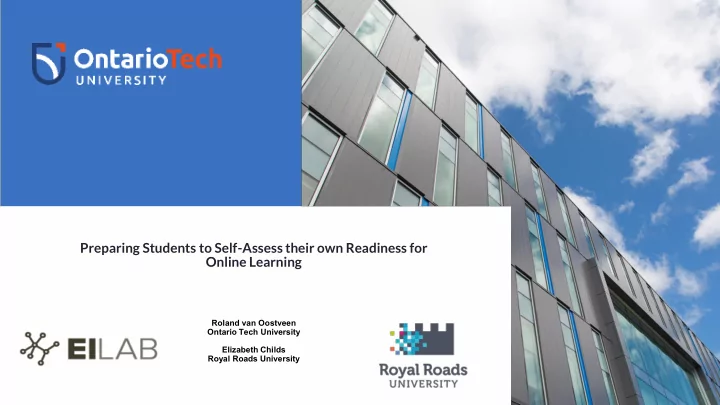

Preparing Students to Self-Assess their own Readiness for Online Learning Roland van Oostveen Ontario Tech University Elizabeth Childs Royal Roads University
Paradigmatic Shifts in Employment Skills Education and Training • With HE institutions moving to fully online offerings indefinitely as a result of COVID-19, the need for appropriately framed tools to assist individuals and institutions in supporting Indigenous learners learning online has been amplified. • Global call for increased emphasis on skill development in complex problem solving, critical thinking, creativity, and collaboration • This call aligns with effective practices for online learning, such as Problem Based Learning: -group collaboration -active participation -active learning -collaborative knowledge construction -learner-centred pedagogies -meaning-making discourse -higher level thinking, analysis, synthesis, and evaluation of real world problems “Digital literacy is now essential for successfully living, learning and working in increasingly digitized society and knowledge economy.” (Brown, 2017) 2
Paradigmatic Shifts in Employment Skills Education and Training • Education is rapidly shifting to more self-directed and personalized learning models. • Participation in 4th Industrial Revolution (4IR) society is highly dependent on developing digital competencies for appropriate and effective use of digital technologies. • Digital competencies, including technical, social, and emotional aspects, are applicable to learning in physical and virtual spaces, and affect career choices, employability, digital citizenship, and democracy in general. • Research suggests positive correlations between digital literacy and self-directed learning, functional literacy, critical literacy, social literacy, cognitive control, metacognitive control, motivational control, and behavioral control. (Fernandez-Rio et al., 2017). 3
Activity: What is the situation in your current context around preparedness for online learning? Faculty? Staff? Students? Other stakeholders? • Post your responses in the Zoom Chat 4
Online Readiness • Learning in Online Environments requires at least two, if not three, sets of interconnected skills and competencies (with suggested sampling tools) 1. Digital devices and apps (Digital Competency Profiler) 2. Learning environments that allow learners to move in directions that are of value to them and to society at large (Fully Online Learning Community Survey) 3. Cultural dimensions that influence the way the world, including digital devices and apps, is viewed and understood (Cultural Dimensions Surveys) 5
The Global Educational Learning Observatory (GELO) and the customizable Global Readiness Explorer (GREx) • The Global Educational Learning Observatory (GELO) project aims to develop an international network of institutions utilizing data-driven and scientifically-informed evidence for evolving best practices for online and mobile learning. • The GELO project includes: - a nucleus of formal educational institutions; - tools to extend research on formal learning models; - workplaces and public spaces with informal learning settings. • The GELO explores: - digital competencies through quantitative and qualitative data gathered through a customizable dashboard called the Global Readiness Explorer (GREx) - measurement of digital competencies of individuals or groups; - development of learning models in higher education and informal learning/training settings in corporate and not-for-profit work environments. - technological and social/cultural interactions 6
Current GREx Tools (contextualizable) • Basic Demographics (Collected for use across the entire tool set) • The Digital Competency Profiler (DCP) • Provides a snapshot of how users employ digital technology in terms of frequency and confidence. Based on a model of Human-Computer-Human Interaction developed by Dr. F. Desjardins (2005). Responses generate a visual profile of relative competency and use of technology in four basic orders: Technical, Social, Informational, and Computational. • The Fully Online Learning Community Survey (FOLCS) (in reliability testing phase) • Provides users with insight (particularly when used with the DCP) regarding users’ readiness to participate in fully online learning communities. Based on the Fully Online Learning Community (FOLC) Model developed by vanOostveen, DiGuiseppe, Barber, Blayone and Childs (2016) • The Personal Cultural Orientations Scale (PCOS) -as an example and not included in the current version that you will be exploring • Provides a multidimensional structure for cultural factors, including independence, interdependence, power, social inequality, masculinity, gender equality, risk aversion, ambiguity intolerance, tradition, and prudence. Developed by Sharma (2010). 7
8
9
General Technology Competency and Use (GTCU) Framework (Desjardins, 2005) 10
Digital Competency Profiler (DCP) 11
Fully Online Learning Community (FOLC) Framework 12 View the research short: https://www.youtube.com/watch?time_continue=9&v=yk1kVbMfbXE&feature=emb_logo
Fully Online Learning Community Survey (FOLCS) This survey is designed to encourage learners to critically examine their readiness to work within Fully Online Learning Community environments. The 26 (5 DS, 7 each for SP, CP, CL) FOLCS statements will be rated using the same indicator scales as employed with the DCP namely, Frequency of Use (5pt Likert Scale) and Comfort with Use (5pt Likert Scale). 13
FOLC Readiness = FOLCS + DCP 14
GREx Dashboard – Tracking your progress When you log into the GREx dashboard after completing the surveys, you will be able to keep track of your progress by seeing your responses to the surveys on the Submissions tab 15
Activity: Explore the tools and then return and Share • GREx Dashboard is available at https://grex.eilab.ca → EILAB Pilot Test Use the Zoom Chat to: • Comment on 1 thing that resonates with you. • Comment on 1 thing that you are curious about. 16
Activity: Envisioning Online Learning • Post on the connected Padlet https://padlet.com/rolandvo/contactnorth_webinar2020 • What is the best version of online learning you can imagine? What is the best version of online learning that your students can imagine? • How can the readiness of students to move into this environment be studied? What are the elements that should be included in your online learning environment? What barriers need to be addressed in this environment? 17
Contact Information Dr. Roland vanOostveen Dr. Elizabeth Childs Ontario Tech University Royal Roads University Oshawa, Ontario Victoria, British Columbia Canada Canada Roland.vanOostveen@ontariotechu.ca Elizabeth.childs@royalroads.ca 18
Recommend
More recommend